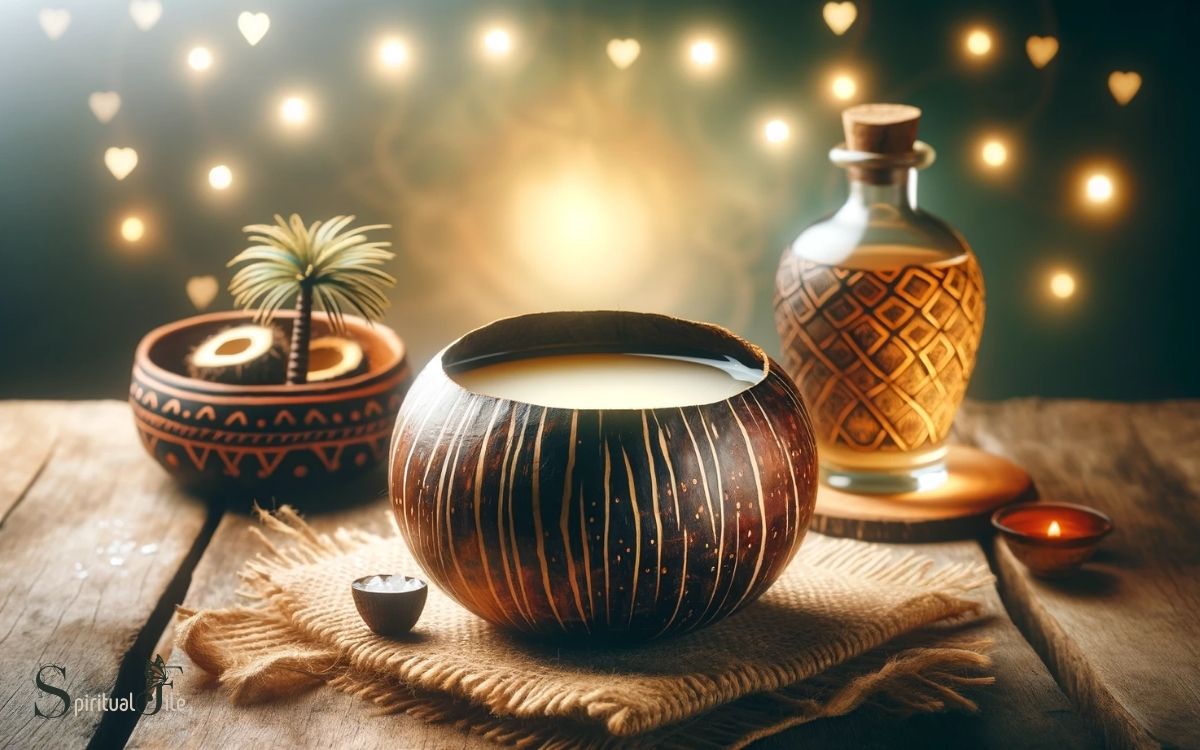Spiritual Use of Palm Wine: Date Palms!
Palm wine, an alcoholic beverage created from the sap of various species of palm tree such as the Palmyra, date palms, and coconut palms, plays a significant role in many traditional spiritual practices.
It is often used in sacred rituals, communal celebrations, and as an offering to deities or ancestors.
With its deep roots in cultural traditions, palm wine is viewed not just as a drink but also as a vessel for spiritual connection and communal bonding. Palm wine holds a sacred place in many cultures, particularly in Africa and parts of Asia.
Its spiritual significance can be attributed to several factors:
For example, in Igbo culture of Nigeria, palm wine is an essential part of traditional marriage ceremonies, symbolizing the joining of two families.
Palm wine’s role in spiritual ceremonies underscores its significance beyond mere refreshment, serving as a bridge between the physical and spiritual realms.

Key Takeaway
Cultural Significance
The cultural significance of palm wine in my community centers around its role in traditional rituals and ceremonies. Palm wine holds a special place in our customs, symbolizing unity and communion during important events.
It is often used in marriage ceremonies, communal gatherings, and ancestor veneration rites. The process of tapping the palm sap and fermenting it is considered sacred, and only individuals with specific roles and responsibilities are allowed to carry out these tasks.
The sharing of palm wine fosters a sense of togetherness and harmony, strengthening the bonds within the community. Its presence at rituals signifies the connection between the living and the spiritual realm, making palm wine an integral part of our cultural identity and heritage.
The respect and reverence for palm wine highlight its deep-rooted significance in our traditions and way of life.
Traditional Ceremonies
Participating in traditional ceremonies involving palm wine has been an integral part of my community’s cultural practices for generations.
During these ceremonies, the spiritual significance of palm wine is further emphasized as it plays a central role in bonding the community and connecting with our ancestors.
- The ceremonies often start with a libation where palm wine is poured on the ground as a gesture of respect to the spirits and ancestors.
- Elders then share palm wine with the community, fostering a sense of unity and communal harmony.
- Traditional songs and dances are performed, accompanied by the sharing of palm wine, creating a joyful and spiritually uplifting atmosphere.
- The ceremonies provide an opportunity for the community to seek guidance from the ancestors and receive blessings for important events such as weddings, harvests, and births.
Ancestral Connections
Engaging in traditional ceremonies involving palm wine allows me to connect with the spirits of my ancestors and seek their guidance for important life events. The act of pouring palm wine as a libation symbolizes a form of communication with the ancestral realm.
It’s a way for me to honor and show respect to those who came before me, acknowledging their wisdom and seeking their blessings.
Through this practice, I feel a deep sense of connection to my roots and a profound understanding of my place in the lineage of my family.
The experience is both humbling and empowering, as I draw strength from the knowledge that I am not alone in facing life’s challenges. It brings me comfort to know that I can call upon the wisdom and support of my ancestors as I navigate my journey.
Divine Symbolism
As a practitioner, I find that using palm wine in traditional ceremonies carries a deep divine symbolism that connects us to the spiritual realm.
This symbolism is rooted in our cultural and spiritual beliefs, and it serves as a powerful link between the physical and metaphysical worlds.
The divine symbolism of palm wine is evident in various aspects:
- Sacred Offering: Palm wine is offered to deities and ancestors as a symbol of gratitude and reverence.
- Spiritual Cleansing: It is used in purification rituals to cleanse individuals and spaces of negative energy.
- Unity and Communion: Sharing palm wine fosters unity and communal harmony, symbolizing the interconnectedness of individuals within the community.
- Symbol of Abundance: The palm tree, from which palm wine is derived, is seen as a symbol of life, fertility, and prosperity.
Understanding these symbolic meanings enhances the spiritual significance of palm wine in our traditional practices, enriching our connection to the divine.
Ritual Practices
When considering the spiritual use of palm wine, it is essential to understand the specific ritual practices that are integral to its ceremonial significance. In traditional ceremonies, palm wine is often used as an offering to deities or ancestors.
The process of pouring the palm wine and the manner in which it is consumed hold deep symbolic meaning within these rituals. It is a way of connecting with the spiritual realm and seeking blessings or guidance.
The communal sharing of palm wine during these rituals also fosters a sense of unity and solidarity within the community.
Additionally, specific prayers or invocations may accompany the serving of palm wine, further emphasizing its role as a conduit between the physical and spiritual worlds.
Understanding these ritual practices is crucial for appreciating the cultural and spiritual significance of palm wine in traditional settings.
Spiritual Beliefs
My spiritual beliefs regarding palm wine stem from its role as a sacred symbol in connecting with the divine and seeking blessings.
- Cultural Significance: Palm wine is not just a drink; it holds deep cultural and spiritual significance in many communities.
- Divine Connection: When consumed in rituals, palm wine is believed to facilitate a connection with ancestral spirits and deities.
- Blessings and Protection: It is thought to bring blessings and protection to individuals and communities, fostering harmony and well-being.
- Sacred Offerings: Palm wine is often offered as a libation in ceremonies, symbolizing gratitude and seeking favor from the spiritual realm.
These beliefs form the foundation of the spiritual practices surrounding palm wine, shaping its role in communal gatherings and ritual ceremonies.
Communal Gatherings
How does palm wine play a role in bringing communities together in communal gatherings? Palm wine has a long-standing tradition of being a unifying element in communal gatherings.
In many cultures, the act of sharing palm wine fosters a sense of togetherness and camaraderie. When people come together to partake in palm wine, it creates an atmosphere of conviviality and bonding.
The communal nature of palm wine drinking encourages open communication, storytelling, and the sharing of knowledge and experiences among community members.
It serves as a catalyst for social interaction, allowing individuals to connect, celebrate, and strengthen their relationships.
As a result, palm wine has become deeply intertwined with the fabric of community life, symbolizing unity and solidarity among the people who partake in its consumption.
Customary Consumption
Alright, let’s talk about the customary consumption of palm wine. It holds a significant place in our culture and traditions, often being a central part of communal celebrations and rituals.
Understanding the traditional brewing methods is key to appreciating the spiritual and cultural significance of palm wine.
Cultural Significance in Consumption
Often during our gatherings, palm wine serves as a symbol of cultural unity and tradition, connecting us to our heritage and ancestors.
- It plays a crucial role in our rites of passage, such as weddings and naming ceremonies, signifying the communal bond and shared values.
- The consumption of palm wine is deeply ingrained in our social fabric, fostering camaraderie and strengthening relationships within the community.
- Its presence at cultural events and festivals underscores the significance of tradition and the preservation of our customs.
- As we partake in this age-old tradition, we honor the legacy of our forebears and reinforce our sense of belonging to our cultural roots.
Traditional Brewing Methods
Transitioning from the cultural significance of palm wine consumption, I have learned that the traditional brewing methods play a vital role in preserving our ancestral customs and strengthening our community bonds.
The process typically involves extracting sap from the palm tree, followed by natural fermentation, often in large wooden or clay containers.
The expertise of our elders in selecting the right palm tree, extracting the sap, and fermenting it with indigenous methods is a crucial part of this tradition.
The communal aspect of brewing and consuming palm wine fosters unity and social cohesion, as it brings people together for celebrations, rituals, and important gatherings.
Learning and preserving these traditional methods not only ensures the continuation of our cultural heritage but also strengthens the connection to our ancestors and the land.
Conclusion
As I sip on the palm wine, I feel connected to generations past, as if their spirits are swirling within the golden liquid. It’s as if each drop holds the stories of my ancestors, their wisdom and strength flowing through me.
In this communal act, I am reminded that we are all interconnected, like the roots of a great tree, nourished by the same earth and reaching towards the same sky. Cheers to the unity of the human spirit.






